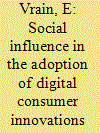|
|
|
Sort Order |
|
|
|
Items / Page
|
|
|
|
|
|
|
| Srl | Item |
| 1 |
ID:
051797


|
|
|
|
|
| Publication |
Oxford, Blackwell Publishers, 2002.
|
| Description |
ix, 317p.
|
| Standard Number |
063121977
|
|
|
|
|
|
|
|
|
|
|
|
Copies: C:1/I:0,R:0,Q:0
Circulation
| Accession# | Call# | Current Location | Status | Policy | Location |
| 045192 | 338.064/STO 045192 | Main | On Shelf | General | |
|
|
|
|
| 2 |
ID:
176812


|
|
|
|
|
| Summary/Abstract |
Information campaigns promoting sustainable technology adoption are common. However, knowledge about their effects is limited. In this study, the effect of a Swedish information campaign for solar photovoltaics (PV) adoption is evaluated quantitatively. The campaign took place in Sweden in 2017 and was directed towards homeowners. 41% of all Swedish municipalities participated, creating a ‘treatment’ and a ‘control’ group. As dependent variables, we used applications and approvals for a nation-wide PV subsidy scheme. Few Swedish PV installations have historically occurred outside of the subsidy scheme, which is quite accessible and offers a substantial rebate. Thus, the data were assumed to correspond well with actual installations. Hierarchical linear regression, with a set of control variables, was used. We found that campaign participation was associated with a 29% increase in submitted and approved subsidy applications. Thus, we conclude that the information campaign had a significantly positive effect on PV adoption rates, and that policy makers in other countries with limited PV penetration could launch similar campaigns to elevate PV adoption rates.
|
|
|
|
|
|
|
|
|
|
|
|
|
|
|
|
| 3 |
ID:
069889


|
|
|
|
|
| Publication |
2005.
|
| Summary/Abstract |
How did the U.S. Navy successfully manage the carrier revolution? This hallmark case challenges traditional explanations of organizational change. Decisive reforms were enacted. The new vision of naval warfare thrived before the "old" battleship-centric orthodoxy was discredited, before it was fully understood, and before its champions seized power within the service. This article posits a modified principal-agent framework to explicate systematically the interplay between new interests and ideas that lie at the crux of managing the diffusion of innovations within military organizations. The main finding is that the nebulous exploration and outcome of transformation rests on strategies employed by service entrepreneurs for lowering the material cost of oversight and invoking established managerial norms that align incentives and "common knowledge" for change within military hierarchies. Evidence from the U.S. Navy's interwar experience with carrier aviation illustrates this administrative dimension to organizational change. The conclusion reviews directions for extending the argument, and lessons for managing contemporary military transformation.
|
|
|
|
|
|
|
|
|
|
|
|
|
|
|
|
| 4 |
ID:
121382


|
|
|
|
|
| Publication |
2013.
|
| Summary/Abstract |
The Irish and British governments have recently mandated the replacement of domestic gas and electricity meters with smart meters. Their deployment strategies differ based on the extent to which deregulation of the gas and electricity market has been successful. A broad debate has been held on the various assumptions justifying the cost-benefit analyses and the permutations of these assumptions. What has been paid less attention is to what end is a smart meter being employed towards. A corollary research question is whether the deployment plan is targeting the correct sector.
If the purpose is to introduce automated meter reading across the housing sector then a better strategy would be to legislate for accurate monthly bills, as in Sweden. Allowing suppliers to have greater flexibility will likely reward rather than stifle the design of competition. If the purpose is to manage demand then it may be that it's working with complex tariffs and not the meter per se that counts. The high consuming end-use categories and profile classes would be better placed for that exercise. Innovation theory also supports the targeting of new innovations to larger consumers, allowing metering innovations to proceed along historical trajectories.
|
|
|
|
|
|
|
|
|
|
|
|
|
|
|
|
| 5 |
ID:
183569


|
|
|
|
|
| Summary/Abstract |
Digital consumer innovations offer low-carbon alternatives to mainstream consumption practices. We contribute new insights on the importance of social influence in the uptake of digital consumer innovations for climate change across mobility, food, homes, and energy domains.
|
|
|
|
|
|
|
|
|
|
|
|
|
|
|
|
| 6 |
ID:
173784


|
|
|
|
|
| Summary/Abstract |
Water scarcity is increasing in South Africa and communities need to be educated about water conservation practices. This article investigated the perceptions of Raymond Mhlaba Local Municipality’s residents concerning the use of social media for water conservation education in their community. Through a quantitative methodology, a sample of 383 respondents answered a questionnaire and the main findings were that 75 per cent of respondents did not know about the municipality’s social media platforms. This article recommends that the municipality creates awareness about its social media platforms, increases social media usage and employs persuasive strategies for participation.
|
|
|
|
|
|
|
|
|
|
|
|
|
|
|
|
| 7 |
ID:
128362


|
|
|
|
|
| Publication |
2014.
|
| Summary/Abstract |
Solar Community Organizations (SCOs) are formal or informal organizations and citizen groups that help to reduce the barriers to the adoption of residential solar photovoltaic (PV) by (1) providing access to credible and transparent information about the localized benefits of residential PV and (2) actively campaigning to encourage adoption within their operational boundaries. We study the peer effect, or social interaction, process catalyzed by SCOs to understand the impact of these organizations on the residential PV market. Using a standardized search methodology across spatial scales (state; city; neighborhoods), we identify and characterize the operations of 228 SCOs formed in the U.S. between 1970 and 2012. We also present case studies of four successful SCOs and find that a common thread of why these SCOs are successful involves effectively leveraging trusted community networks combined with putting together a complete information and financial-tools package for use by interested communities. Finally, our findings suggest that empirical studies that attempt statistical identification and estimation of peer effects should pay close attention to the role of SCOs, as the social interactions engendered by SCOs may be correlated both with the level of social learning and the socio-demographic characteristics of the communities of interest.
|
|
|
|
|
|
|
|
|
|
|
|
|
|
|
|
| 8 |
ID:
110701


|
|
|
|
|
| Publication |
2011.
|
| Summary/Abstract |
The adoption of innovations in rural areas depends, among many different factors, on the way development workers approach a community. Through a qualitative research methodology this study documented the adoption of a new technology, by following an improved cookstove implementation program carried out by a Mexican NGO. This technology reduces fuel consumption and addresses health impacts of indoor air pollution caused by the widespread use of traditional biomass fuels in open fires in developing countries. Different demographic and socio-economic factors have been analyzed to explain the low success rates implementation projects have faced worldwide, but there are almost no studies that examine the problem from the perspective of implementers. The aim of this study was to understand how the different visions of the individuals involved in an implementation program affect its outcome. Findings showed that the NGO work was constrained by the need to meet the commitment with sponsors. The adoption rates did not change between the first and the second stage of the project, even though the approach towards users was very different. A lack of a shared vision among the work team towards the project was found and the existence of two main perspectives among program workers-broadly described as people-centered and technology-centered-, gave place to differences in attitudes towards the program.
|
|
|
|
|
|
|
|
|
|
|
|
|
|
|
|
| 9 |
ID:
065923


|
|
|
|
|
| Publication |
London, Penguin Books, 2005.
|
| Description |
viii, 488p.
|
| Standard Number |
0713998784
|
|
|
|
|
|
|
|
|
|
|
|
Copies: C:1/I:0,R:0,Q:0
Circulation
| Accession# | Call# | Current Location | Status | Policy | Location |
| 050167 | 303.4833/FRI 050167 | Main | On Shelf | General | |
|
|
|
|
|
|
|
|
|